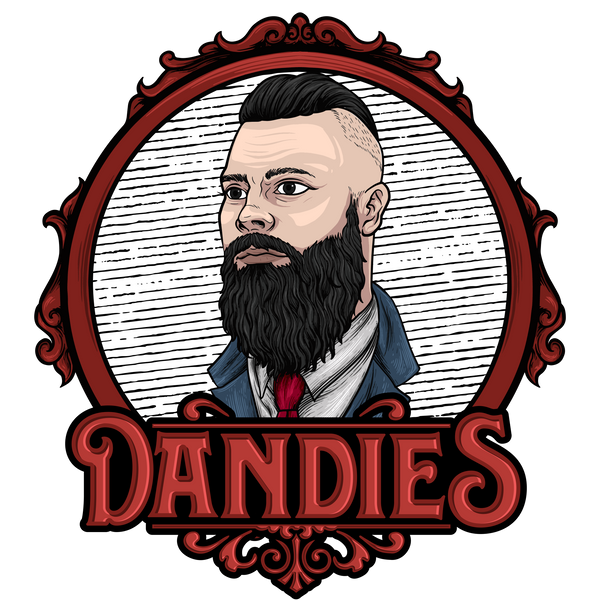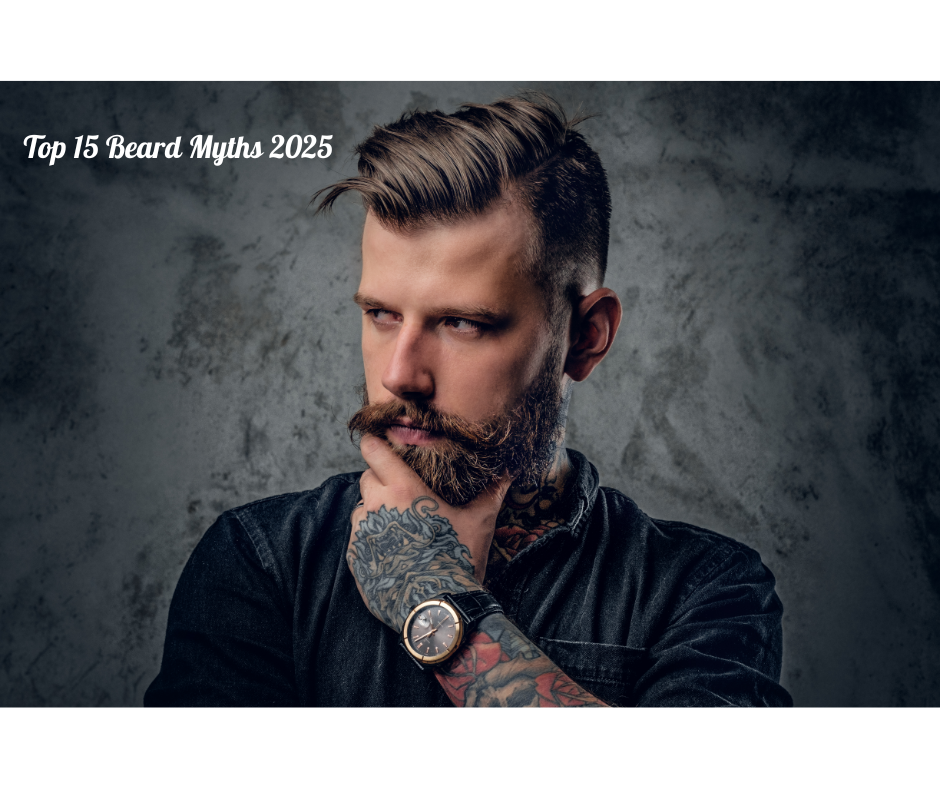A beard grow-out is more than just letting your facial hair go wild — it’s a process. Along the way, you’re likely to hear a variety of tips, suggestions, and cautionary tales — many of which simply aren’t true. From the cliché “shaving makes your beard grow faster” to the idea that “beard oil isn’t necessary,” there are plenty of myths that can seriously mess with your grooming game.
In this article, we’re clearing the fog. We’ll bust the top 15 beard-care myths and give you the real facts so you can take better care of your beard.
Whether you’re just starting your journey or you’ve got a full-grown beard, knowing what’s true (and what’s totally false) is key to keeping your beard healthy and stylish.
Let’s dive in and finally debunk those beard myths for good.
Top Beard Myths
Myth #1: Shaving Makes Your Beard Grow Faster
This is one of the most common beard-care myths. The belief that shaving promotes faster or thicker beard growth is completely false. Hair follicles underneath the skin control the speed and fullness of hair growth — not shaving.
When you shave, the hair that grows back might look thicker due to the blunt edge, but it doesn’t actually grow faster or denser. Hormones, genetics, and overall health mainly influence beard growth.
Myth #2: Beards Are Dirty and Full of Germs
Beards can collect dust and dirt throughout the day — but so can the hair on your head. With proper grooming, a beard can be just as clean as any other part of your body. In fact, washing your beard regularly helps keep bacteria away and can prevent issues like beard dandruff and itchiness.
Myth #3: Beard Oil Is Only for the Beard Hair
This myth often leads to patchy beards and irritated skin. Beard oil isn’t just for your facial hair — it’s mainly designed to hydrate and nourish the skin beneath your beard. Healthy, moisturized skin is crucial for supporting strong beard growth and avoiding common problems like dryness, flaking, and itchiness.
Myth #4 Beard Oil Doesn’t Need to Be Used
Let’s be honest — beard itching is painful. But the good news? It’s totally avoidable.
Regularly applying nourishing beard oil or a beard cream helps prevent hair from becoming dry, brittle, and irritatingly itchy. It also moisturizes the skin underneath, keeping flaky, unattractive beardruff at bay.
Beard oil also helps reduce frizz, giving your beard a neater and healthier look. And don’t let the name "beard oil" fool you — if you’re only applying it to the hair, you’re missing out on half the benefits. Always massage it into the skin beneath your beard as well.
Another bonus? Beard oil gives your beard a nice, healthy shine — never dry or greasy.
Myth #5: Brushing or Combing Too Often Will Damage Your Beard
While brushing too aggressively can cause damage, regular brushing and combing are actually important parts of a good beard routine. It helps distribute beard products and natural oils evenly throughout your beard, keeping it smooth and tangle-free.
Plus, brushing boosts blood circulation, which can encourage healthy beard growth.
Myth #6: You Should Use the Same Shampoo for Your Beard as You Do for Your Hair
Beard hair is different from the hair on your head, and the skin underneath your beard is more sensitive than your scalp.
Most regular shampoos are too harsh for beards — they strip away natural oils, leaving your skin and beard dry and irritated. That’s why it’s better to use a product made specifically for facial hair.
Myth #7: A Beard Will Grow Evenly on Its Own
Many men experience patchiness, especially in the early stages of beard growth. This could be due to genetics or uneven growth cycles. But patchiness in the beginning doesn’t mean your beard will stay that way forever.
With the right care and patience, most beards fill out over time.
Myth #8: Longer Beards Don’t Need As Much Care
The longer your beard grows, the more care it needs. Longer beards are more prone to split ends, tangles, and dryness — which means proper grooming becomes even more important.
Trimming, moisturizing, and detangling all play a bigger role as your beard gets longer and fuller.
Myth #9: Brushing Is of No Use
Brushing your beard with a natural boar bristle brush does more than just feel good — it actually helps your beard look and feel its best. It tames unruly hairs and keeps them soft by evenly distributing natural oils and any beard products you’ve applied.
But that’s not all! Brushing offers several other benefits:
- It cleans the beard by removing dust and debris
- It stimulates the skin underneath
- Exfoliates the skin and helps reduce beard dandruff
- It detangles the beard and helps train the hairs to grow in the right direction
- Makes styling much easier
- It helps reduce breakage and snagging
So no — brushing isn’t pointless. It’s actually one of the most helpful steps in your beard-care routine.
Myth #10: Regular Hair Straighteners Are Safe for Beards
As your beard grows longer, you might notice it starting to curl — and you might be tempted to straighten it to show off its full length. But using a regular hair straightener can do more harm than good.
For starters, traditional straighteners weren’t designed for facial hair — and honestly, they’re not that great for scalp hair, either. Applying direct heat can weaken your beard hairs and make them brittle. Over time, this can lead to breakage and heat damage that may need to be trimmed away.
While there are beard-specific straighteners on the market, they should be used with caution. Too much heat is rarely a beard’s best friend. Some people swear by them, but in our experience, the downsides outweigh the short-term benefits.
If you want a straighter, more polished look, try applying a quality beard balm and then brushing your beard into place. It’s safer, healthier, and still gives you great results.
Myth #11: Only Certain Ethnicities Can Grow Beards
This idea is as absurd as saying only certain people can grow hair on their heads. The ability to grow a beard depends on genetics and hormones — not ethnicity. Men from all racial backgrounds are capable of growing beards; they simply vary in thickness, density, and growth pattern.
Whether you're a fair-skinned redhead, a dark-skinned African man, or anyone in between — if your genetics support it, you can grow a beard and wear it with pride.
Myth #12: You're Too Young to Grow a Beard
Just because you're not old enough to buy a drink doesn’t mean you can’t grow facial hair. Beard growth is based on your genetics and hormone levels, not your age. Some men start growing beards earlier, while others begin a little later.
As long as your hormones are balanced and your health is in good shape, you'll likely be able to grow a beard eventually.
If you’re a teenager dealing with patchy growth, don’t stress — your beard just needs time to develop.
Myth #13: Beards Are Only for Older Men
Beards aren't exclusive to older men. If you're able to grow one, age shouldn’t be a barrier. Being young doesn't disqualify you from having facial hair. Whether it’s a light stubble or a fuller beard, you don’t have to wait until you’re “older” to enjoy it.
Rock your beard confidently, no matter your age.
Myth #14: Beards Are Always Itchy
Beards can become itchy — but only if they’re not taken care of. The skin beneath your beard can dry out and become irritated, especially without proper grooming. That’s where quality beard oils or balms come in.
These products moisturize both your facial hair and the skin underneath, reducing itchiness and discomfort. So, if you’re dealing with a beard itch, the solution is simple: treat your beard with a nourishing oil or balm to keep things soft, smooth, and healthy.
Myth #15: Beard Balms Cause Acne
If beard balm is part of your daily grooming routine or you're exploring ways to style and soften your beard, you might’ve heard the claim that beard balms cause acne.
Since beard balm works like a leave-in conditioner for your facial hair, it’s easy to assume that applying it to your face could clog pores and trigger breakouts.
But in reality, this is just another myth that doesn't hold up.
Beard balms are not designed to cause acne — in fact, quite the opposite. A good-quality balm is meant to hydrate both your beard and the skin underneath. When your skin is properly moisturized, it's less likely to become inflamed or irritated, which can actually help reduce acne.
As with any new product, it's smart to read the ingredient list and check reviews before applying anything to your skin. Since different brands use different formulas, some balms may work better for you than others. But overall, the goal of a beard balm is to nourish your skin and hair — not harm it.
Conclusion
Taking care of your beard doesn't have to be complicated, but it does require the right knowledge. As you've seen, many common beard myths can actually do more harm than good when followed blindly.
Whether it’s skipping beard oil, using harsh shampoos, or assuming your beard will grow evenly on its own, these beliefs can stop you from achieving the beard you truly want.
Now that you know the facts, you’re in a better position to build a solid beard care routine, use the right products, and give your beard the care it deserves.
Forget outdated advice — stick with the truth, and enjoy keeping your beard healthy, well-groomed, and stylish every day.
FAQs
What are some interesting facts about beards?
The average beard grows about 5.5 inches per year and has around 30,000 individual hairs. If a man never trimmed his beard, it could reach an incredible length of 27 feet 6 inches by the time of his death. The longest beard ever recorded measured 17 feet 6 inches!
Why do men grow beards?
Beards can influence how others see you — they’re often linked to traits like maturity, masculinity, status, and even strength. Some experts believe beards might serve as a way to appear more dominant or to deter competition from other men.
What does a big beard symbolize?
In many cultures, a long beard is a symbol of wisdom, maturity, and power. Whether you're in a traditional or modern setting, a full, thick beard tends to stand out and earn respect.
Do beard oil kits really work?
Yes, they do — mainly because of the powerful oils used in them. Most beard oil kits include ingredients like castor oil, which plays a key role in promoting growth. Castor oil helps balance natural oils on your skin and reduces the buildup that can slow down beard growth.

